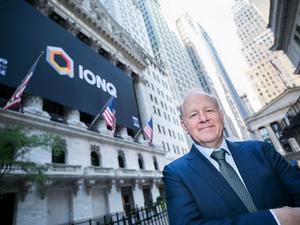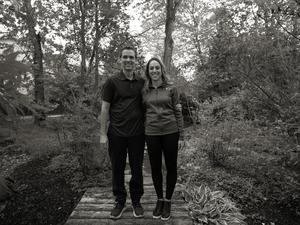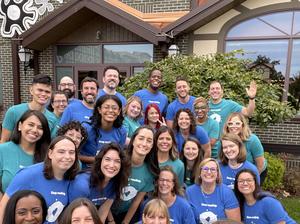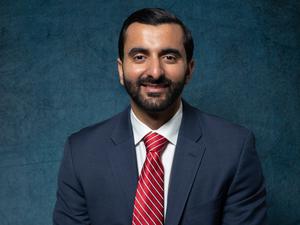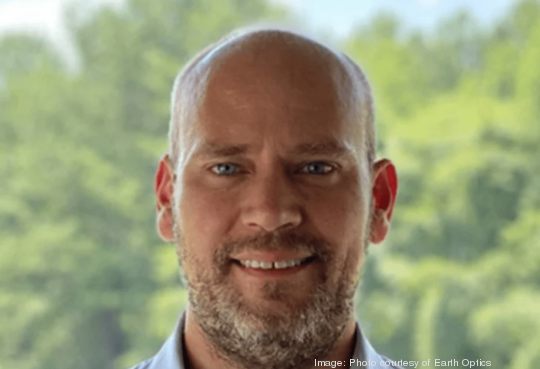
Arlington-based EarthOptics, a soil tester that uses satellite imagery and machine learning to create detailed carbon maps of farms, raised a $27.6 million funding round to grow internationally and meet what it says has been a fast-growing market demand in just the past year.
The Series B round was led by Conti Ventures, the venture arm of international agriculture conglomerate Continental Grain Co., with participation from the Netherlands' Rabo Food & Ag Innovation Fund; London-based CNH Industrial; Louis Dreyfus Co. Ventures, an arm of an agricultural company based in the Netherlands; and the joint venture fund of farmer-owned cooperatives CHS and Growmark's Cooperative Ventures.
As sustainable agriculture gains in recognition, ag-tech providers like EarthOptics — which aims to be a Google Maps of sorts for more sustainable farming — have received more of the spotlight. CEO Lars Dyrud said the local company has seen fivefold growth in its revenue, which he declined to specify, and in the past 12 months, it's doubled in size to 70 employees. The funding, he said, will help sustain that growth trajectory.
“We invest in technology that allows us to measure soil attributes more cost-effectively, at higher resolutions, for all stakeholders around soil,” Dyrud said. “And ultimately, we're all stakeholders around soil, because the food we eat and the nutrition value of that food all comes from the soil.”
Although EarthOptics does perform soil measurements to help increase a farm's yield and quality, a primary moneymaker for the company has increasingly been to track carbon, or CO2, in soil sets. A new market has emerged in recent years for large agricultural conglomerates like Bayer AG and Cargill Inc. to pay farmers per acre to sequester carbon, or store it underground in the soil, as a way to slow global warming. Such carbon sequestering could grow to store 2 billion to 5 billion metric tons of carbon dioxide in soil each year by 2050, according to one estimate.
Although the jury is still out on its effects and benefits, the trend has some farmers making up to $150,000 in additional income annually, according to Greenbiz. For farmers who don’t know how much CO2 they’ve stored, that’s where EarthOptics comes in.
The challenge comes in doing that cost-effectively, Dyrud said. And that, he said, is where the funding comes in. The company hopes to expand internationally via a partnership program, where other companies can use its technology to map farms and do soil measurements. It would save EarthOptics the cost of having to map a territory manually itself, using sensor-laden ATVs and taking samples via its staff — particularly when its customer base spans, Dyrud said, most of the U.S., as well as Canada and Australia.
"Managing a national, international operation since we do have to go to the field to make measurements" remains its biggest challenge, he said. The funding will help add more staff, and he said he expects that hiring growth rate to mirror that of last year.
But as the market grows, so does it grow more crowded, another potential challenge for EarthOptics. Ireland's CarbonSpace and Germany's Spacenus GMBH are active international players in the sector, while Silicon Valley's Boomitra just raised its own $4 million in 2021 to compete.
The latest Series B round more than triples EarthOptics' total fundraising, which included a $10.3 million injection in 2021 from Bayer's impact investing arm. Its lifetime funding now sits just shy of $40 million.
It taps into technology that spawned from a sponsored research program out of Massachusetts Institute of Technology. The startup originally spun out of the AgTech Accelerator in Research Triangle Park in Raleigh, North Carolina, in 2018 with an initial $2 million investment and co-founders who now serve as its chief commercial officer and chief technical adviser. At the time, it was called GroundTruth Ag.
But Dyrud, who joined EarthOptics in January 2020, per his LinkedIn, has a history with the D.C. area. He worked at the Johns Hopkins University Applied Physics Lab, whose main campus is in Laurel, and before his tenure at EarthOptics, he co-founded OmniEarth, a satellite-based environmental analytics company in Arlington, in 2014. He later sold that business in 2017 to EagleView Technologies for undisclosed terms.
His experience building companies in this region, acknowledgement of its talent pool and still-current residence here prompted him to move EarthOptics' headquarters from North Carolina to Arlington in the summer of 2021.
“It's one of the best places to identify a range of talent, both back-office folks like contract management, but down to scientists and programmers as well,” Dyrud said. “We’re increasingly seeing more technology companies that recognize some of the benefits of the area that we do.”
